Top 15 Strengthening Exercises For Teres Major And Teres Minor

Written by Kiel DiGiovanni | Co-founder
Fact checked by Kirsten Yovino, CPT Brookbush Institute
 FACT CHECKED
FACT CHECKED
A quick Google search of teres major might lead you to a butcher’s website for steak where it's described as the second most tender cut of beef. We won’t be covering the teres major of a cow in this article. Instead, we will go over the two muscles found in your upper back, the teres major and teres minor. The teres major plays an important role in moving your arms and shoulders. It can also add width to the much desired “V look. The teres minor is the smaller of the teres muscles and it helps to stabilize the ball and socket glenohumeral joint and supports lateral or external rotation of the arm at the shoulder joint. It's vital to strengthen the teres major and teres minor muscles to prevent potential shoulder pain. Unbeknownst to many, the culprits causing this pain might be the teres major or the teres minor. It’s about time you know their names.
This post will cover:
- What are the teres major and teres minor muscles?
- What are the teres major and teres minor functions?
- The 15 best teres major and teres minor strengthening exercises
- How to fix teres major and teres minor pain

What’s the difference between the teres major and teres minor?
Although they share a name, both of the teres muscles have different functions in the human body. This is due to where they’re based on the humerus. The teres major muscle shares a common end tendon with the latissimus dorsi on the front of the humerus. The teres minor is based on the tuberosity (where muscles and connective tissues attach) of the humerus head.

What is the teres major muscle?
Its name is derived from the Latin word teres, meaning “rounded” and major being the bigger of the two teres muscles. This muscle is located above the latissimus dorsi. The teres major muscle attaches to the humerus and the scapula. Many people think that the teres major is part of the rotator cuff muscle but it isn’t as it doesn’t attach to the capsule of the shoulder joint. Fun fact, the teres major is sometimes referred to as the lats little helper. Ladies, if you're looking for a sleek back, targeting the teres major in your women's back workout is essential, as it forms a lovely bubble shape when it's developed.
What is the teres major function?
The teres major helps with the internal and medial rotation of the humerus (upper arm) by pulling the anterior surface of the humerus towards the trunk. It also helps to extend the arm from a flexed position. The teres major is sometimes referred to as the climbing muscle as it works in unison with the pectoralis major (pecs) and latissimus dorsi(lats) muscles to pull the trunk via adduction when its humeral attachment is fixed. This muscle also supports and helps to stabilize the lats especially in wood chopping movements. The teres major action plays an important role many arm swinging movements.
What is the teres minor muscle?
Once again, the name teres comes for the Latin word "rounded" and minor from it being the smaller of the two teres muscles. One of the four muscles that comprise the rotator cuff, the teres minor is located below the infraspinatus and above the teres major and next to the triceps brachii.
What is the teres minor function?
The teres minor and the infraspinatus work in conjunction to hold the humeral head in the glenoid cavity of the scapula. Apart from this, the teres minor action helps stabilize the shoulder, supports external rotation of the shoulder and aids in the adduction and extension of the shoulder.
Want to pack on pounds of lean muscle in 12 weeks? Check out our SFS Hypertrophy Program developed by Garett Reid (NSCA, CSCS, CISSN, M.S.E.S.S).

Prepare to maximize your gains with our exclusive 12-week hypertrophy training program. Choose between a 4 or 5 day training split and gain 2-12 pounds of muscle over 90 days...
Top 15 Teres major and teres minor Strengthening Exercises
We put together 15 of the best exercises you can add to your workout to strengthen the teres major and teres minor muscles. All of these exercises also work other various muscles of the back, shoulders and chest, this is because your teres muscles work in concert with multiple muscle groups. Due to the location and function of the teres major and teres minor you will be strengthening the neighboring muscles as well.
1. Dumbbell Pullover:
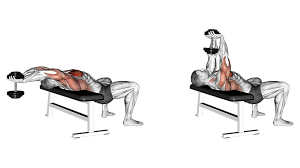
- Lie across the bench with only your upper back and neck being supported by the bench
- Hold dumbbell with both hands, forming a triangle with your hands or by gripping the inner plate
- Hold the dumbbell directly above your chest with elbows bent slightly
- Engage your core and slowly lower the dumbbell past your face and over your head as far as you can
- Pull the dumbbell back over your face to starting position
- Repeat desired reps
Note: Keep your core engaged throughout this movement.
2. Cable Straight Arm Pull Down:
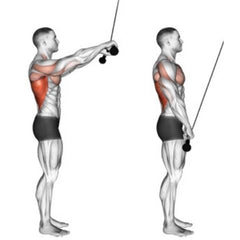
- Attach a wide grip handle or other accessory above head to the cable machine
- Grab the handle with an overhand grip using both hands at shoulder width
- Hinge forward slightly at the hips and with your elbows slightly flexed pull down on the handle by depressing your shoulder blades while extending your shoulders
- Pull down until the handle reaches your thighs
- Slowly return to starting position
- Repeat for desired reps
Note: Keep your core tight throughout the movement and focus on pulling the bar down with your lats not your arms - this is key for the straight arm lat pulldown.
3. Inverted Row:
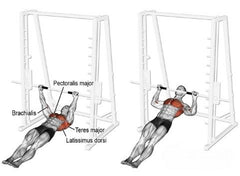
- Set up bar slightly higher than your arm’s length above the ground
- Sit under the bar with your legs stretched out in front of you
- Reach up grabbing the bar with both hands using an overhand grip wider than shoulder width apart
- Straighten your body so your arms are straight and heels are on the floor
- Pull up by retracting your shoulder blades until your chest hits the bar
- Slowly lower to starting position
- Repeat for desired reps
Note: Keep a neutral spine throughout the movement while keeping core engaged without letting your hips drop.
4. Underhand Yates Row:
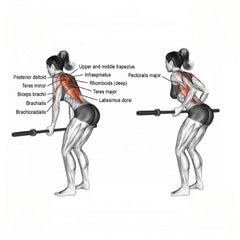
- Grab a barbell with both hands using an underhand grip at shoulder width
- Bend and the knees and hinge forward at the hips at 45 degrees
- Your arms should be almost fully extended with the bar over your thighs
- Pull the bar up to your waist
- Briefly pause at the top then slowly return to starting position
- Repeat for desired reps
Note: Keep your body stationary and pull up through the elbows not using your biceps.
5. Underhand Grip Lat Pull down:
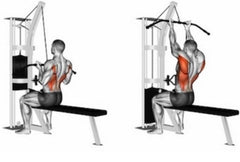
- Sit on a bench facing the cable machine
- Reach up and grab the bar with both hands using an underhand grip, shoulder width apart
- Pull down on the bar by bringing your shoulder blades down and back until the bar reaches your chest
- Slowly return to starting position
- Repeat for desired reps
Note: Keep your chest up throughout the exercise.
6. Lat Pull Downs:
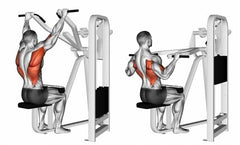
- Sit on a bench facing the cable machine
- Reach up and grab the bar with both hands using an overhand grip, hands a little wider than shoulder width apart
- Pull down on the bar by bringing your shoulder blades down and back until the bar reaches your chest
- Slowly return to starting position
- Repeat for desired reps
Note: Switch up the targeted muscles by trying wide grip pulldown or neutral grip pull down.
Related:
7. Pull Ups:
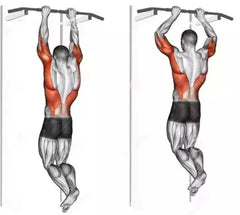
- Grab the bar, hands shoulder width apart using an overhand grip
- Begin with arms completely straight and pull your chest up toward the bar as high as you can
- Hold briefly at the top then return to starting position
- Repeat for desired reps
Note: Retract your scapula by squeezing your shoulder blades back and down together.
8. Chin Ups:
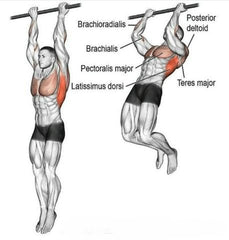
- Grab the bar, hands shoulder width apart palms with an underhand grip
- Begin with arms completely straight and pull your chest up to the bar as high as you can
- Hold briefly at the top then return to starting position
- Repeat for desired reps
Note: Retract your scapula by squeezing your shoulder blades back and down together.
Related: Pull-ups vs Chin-ups
9. Single Arm Dumbbell Row:
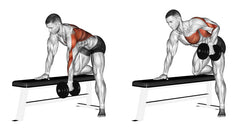
- Grab a dumbbell with a neutral grip with your right hand then place your right knee and right hand under your shoulder on a bench. Hold the dumbbell with your left arm straight directly under your left shoulder
- Pull the dumbbell upwards, bending at the elbow and keeping your arm close to your body until the dumbbell is next to your hip
- Slowly lower to starting position
- Repeat for desired reps
Note: Keep your core engaged throughout the movement and keep your body stationary without rotating at the hips.
10. Seated Cable Rows:
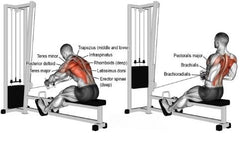
- Sit on a bench with your knees bent then reach forward and grab the triangle handle
- Pull the handle back towards your navel keeping your back straight and squeezing your shoulder blades together
- Slowly return to starting position
- Repeat for desired reps
Note: Keep chest up throughout the movement and pull through your elbows.
Related: Seated Cable Rows Alternatives
11. High Cable Reverse Crossover Fly:
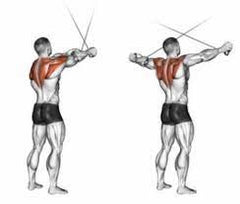
- Start with both handles at head height on the cable machine
- Stand facing in the center of the two-pulley machine
- Reach up and across your body with both hands grabbing the handles with an overhand grip (or grab the cables)
- Pull your elbows down, out and back as far as possible until your arms are in line with your back
- Slowly return to starting position
- Repeat for desired reps
Note: Avoid leaning forward and keep torso and legs stationary throughout the movement
Related: Cable Rear Delt Fly Variations
12. Cable Supine Reverse Fly:
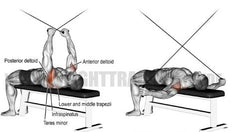
- Start with a bench in the center of two pulleys
- Reach up across your body grabbing both handles(cable) with an overhand grip
- Lie down on the bench with your arms crossed above your chest with your elbows slightly bent
- Pull your arms down to the sides until your elbow is level with your shoulders, keeping your arms perpendicular to your torso
- Slowly return to starting position
- Repeat for desired reps
Note: Keep your upper back against the bench throughout the movement
Related: Best Cable Shoulder Exercises
13. Dumbbell Reverse Fly:
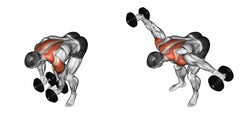
- Grab the dumbbells with both hands with a neutral grip
- Then hinge at the hips until your body is almost parallel to the floor
- Starting with your arms hanging down from the shoulders pull the dumbbells up and back until your elbows are level with your shoulders
- Slowly lower to starting position
- Repeat for desired reps
Note: Don’t lock out your elbows and keep your core engaged throughout the movement
14. Band Pull Aparts:

- Stand up straight, feet shoulder width apart
- Grab the band close to the ends with an overhand grip
- Raise arms out in front of you at shoulder height
- Pull the band apart by squeezing your shoulder blades together
- Slowly return to starting position
- Repeat for desired reps
Note: Focus on retracting your shoulder blades and maintain a neutral spine throughout the movement
15. Face Pulls:

- Set the cable at head height
- Grab the handles or rope with an overhand grip
- Keeping your elbows below your shoulders pull back until your hands are parallel to your face
- Slowly return to starting position
- Repeat for desired reps
Note: Turn your hands slightly while pulling back to get the external rotation of the shoulder which engages your rotator cuff.
Related: Face Pull Alternatives
Teres major pain
There are a number of activities or repetitive motions that may cause pain in the teres major. Certain constant movements like using your computer mouse for hours on end with your arm stuck at your side and your arm/hand are rotating slightly inwards can cause pain in the teres major. Other actions such as writing for long stretches of time or imbalanced training can cause shortening of the teres major.
The teres major can then become spastic, pulling the head of the humerus into the socket incorrectly. This can cause numerous problems including added stress on other muscles and the weakening of the shoulder joint. Sometimes reaching higher than shoulder level will have people take notice of the teres major pain. Shortened teres major muscles can lead to mid back, shoulder and neck pain. Trigger points in the teres major are frequently related to frozen shoulder syndrome.
How to fix Teres Major Pain:
If you’re experiencing teres major discomfort or pain described above then it’s important to know how to alleviate this pain before it leads to other more serious issues. Three crucial elements of keeping your muscles pain free are myofascial release, stretching and strengthening.
Teres Major Myofascial Release
Trigger point therapy or myofascial release therapy can work wonders for teres major muscle pain. You will need a lacrosse(massage) ball or any other type of semi-hard ball to help release your teres major muscle.
Standing/Lying Teres Major Release:- Place the ball on the outside of your shoulder blade just below your rotator cuff next to your armpit
- Lean into the wall/floor on the ball
- You can do some shoulder movements here such as:
- Cross arms at shoulder level in front of your body, pull active side arm across your body then repeat
- Press hand up as if you’re doing an overhead press
Teres major stretches
Stretching is an important aspect of any well-rounded exercise routine especially concerning the teres major as many people experience pain because the muscle becomes too tight. Here are three easy stretches for your teres major helping to get the blood flowing back into the muscle. If you’re experiencing pain from tight teres major muscles trying doing these stretches a few times a week especially after any back workouts.
Dead Hang:
- Grab a pull up bar with both hands using an overhand grip
- Hang for 20 seconds
Overhead Side stretch:
- Lie on your right side, on your bed or bench with your head on a pillow
- Reach over your head with your left arm
- Your left arm should be resting on your left ear, with your palm facing the floor
- Hold for 20 seconds
- Switch sides
Note: For a deeper stretch roll your top shoulder forward to the surface of the bed/bench
Standing Elbow Wall Stretch:
- Raise your left arm over your head then bend at the elbow so your hand is behind your upper back
- Lean your left elbow into the wall
- Tilt your face in towards your armpit
- Hold for 20 seconds
- Switch Sides

Teres Minor Pain
Belonging to the rotator cuff, the teres minor tendon can become irritated or inflamed during a process called tendinitis. Usually an external injury, this is generally caused by repetitive overhead movements. People will feel pain and might hear a clicking sound when raising their arm over their head. Treatment for teres minor pain include trigger point therapy or myofascial release, rest and ice.
Stretching and strengthening is also important to help ease the pressure. It’s imperative to know just how bad your teres minor pain is so that you make the problem worse. Here is a specific test to determine if you have any tears in your teres minor muscle.
Hornblower’s Sign aka (Teres Minor Test):
Start with your arms at 90 degrees in the scapular plane (arms up to your sides at shoulder level) with your elbows bent at 90 degrees. A doctor or technician will apply resistance against external rotation. The person will be asked to raise their hands into making a “field goal sign”. If the person can’t externally rotate at the shoulder, then the pathology indicates it might be a tear in the teres minor.
How to fix teres minor pain:
Teres minor pain can be a real annoyance when you try to lift your arms over your head. To curb the pain of the teres minor muscle you should follow the same advice of the teres major protocol; trigger point therapy, stretching and strengthening of the teres minor. This should help alleviate the tightness and pain if it is mild. If you have serious pain and can’t move your arm at all above your head then you should see a doctor to check if you have a tear in the teres minor or infraspinatus muscle.
Teres Minor Trigger Point Release:
- Once again you will need a massage ball or any other semi rigid ball that can help to apply pressure to the sore spot.
- Lie down on your side
- Place the ball on the outer edge of your shoulder blade, close to your armpit
- Reach your arm out perpendicular to your shoulder and rest on your elbow
- Bend your elbow at 90 degrees so that your hand is going towards the ceiling
- Use your other hand to support your body with your elbow bent at 90 degrees and your hand on the floor in front of your chest
- Start moving your active arm back and forth in a arm wrestling movement
- Do this for 20-30 seconds
- Switch sides
TERES MINOR STRETCHES
Crossbody Stretch:
- Standing with your feet shoulder width apart bring your arms up and across your body like you’re hugging yourself with your left arm under your right arm
- Place your right hand over your left triceps and pull across your body
- Hold for 30 seconds
- Switch sides
Winged Door Stretch:
- Bend your left arm at the elbow and fold arm behind your back so that the top of your left hand is resting against your midback
- Keeping your forearm parallel to the floor, lean back into the door frame or post applying pressure on your elbow
- Hold for 30 seconds
- Switch sides
Sleeper’s Stretch:
- Lie down on the floor/ bed roll up on your left shoulder blade at 30 degrees with your head on a pillow
- Start with your arm out to your side at 90 degrees then bring down do that your triceps are in contact with the floor and your left elbow is parallel with your chest
- Reach across your body with your right hand and gentle push down on your left wrist
- Hold for 30 seconds
- Switch sides

Prepare to maximize your gains with our exclusive 12-week hypertrophy training program. Choose between a 4 or 5 day training split and gain 2-12 pounds of muscle over 90 days...
Final Note:
We hope you have a better understanding of the teres muscles now. It’s important that you regularly target the teres major and teres minor in your workouts. From someone who experiences frequent tightness in this region I can assure you that consistent stretching and trigger point sessions will enable you to reach up for the sky with no problems.
More Resources on Back Strengthening Exercises:

Also in Blog
About Us
At SET FOR SET, we strive to equip you with the tools and knowledge needed for your fitness journey. Our team of experts, including certified trainers, dietitians, and athletes, brings over a decade of industry expertise. Our goal is to be your primary resource for all fitness inquiries, guiding you toward a stronger and healthier life. Sign up to stay up-to-date!
Recent Articles
-
New Research Reveals The BEST Progressive Overload MethodApril 02, 2024
-
8 Reasons Why You Look Like You Don't LiftApril 01, 2024
-
Jake Gyllenhaal's Roadhouse Workout: How He Got RippedMarch 27, 2024
Must Reads
-
The Best Upper Lower Workout Plans (2, 3, 4, & 5 Day Splits)October 03, 2023
-
The Ultimate "Bro Split" Workout Plan (Backed By Science)August 05, 2023
-
The Ultimate Push Pull Legs (PPL) Workout Split RoutineAugust 03, 2023
EXERCISES
- Best Quad Exercises
- Best Hamstring Exercises
- Best Glute Exercises
- Best Calf Exercises
- Best Upper Chest Exercises
- Best Lower Chest Exercises
- Best Front Delt Exercises
- Best Side Delt Exercises
- Best Rear Delt Exercises
- Best Triceps Exercises
- Best Biceps Exercises
- Best Forearm Exercises
- Best Lat Exercises
- Best Trap Exercises
- Best Upper Back Exercises
- Best Mid Back Exercises
- Best Lower Back Exercises
- Best Ab Exercises
- Best Oblique Exercises
DUMBBELLS
- Dumbbell Chest Exercises
- Dumbbell Shoulder Exercises
- Dumbbell Arm Exercises
- Dumbbell Biceps Exercises
- Dumbbell Triceps Exercises
- Dumbbell Forearm Exercises
- Dumbbell Leg Exercises
- Dumbbell Quad Exercises
- Dumbbell Hamstring Exercises
- Dumbbell Glute Exercises
- Dumbbell Calf Exercises
- Dumbbell Back Exercises
- Dumbbell Lat Exercises
- Dumbbell Trap Exercises
- Dumbbell Full-Body Exercises
- Best Weight Benches for Home Gyms
- Best Dumbbell Racks
- Best Dumbbell Sets
- Best Adjustable Dumbbells
BARBELL
- Barbell Squat
- Barbell Deadlift
- Barbell Bench Press
- Barbell OHP
- Barbell Bent Over Row
- Barbell Front Squat
- Barbell Curls
- Barbell Leg Exercises
- Barbell Chest Exercises
- Barbell Back Exercises
- Barbell Shoulder Exercises
- Barbell Biceps Exercises
- Barbell Triceps Exercises
- Best Barbell Exercises
- Best Landmine Exercises
- Best Power Racks
- Best Bumper Plates
- Best Barbells
- Barbell Weight & Size Guide
BODYWEIGHT
CABLE MACHINE
SMITH MACHINE
ALTERNATIVES
- Deadlift Alternatives
- Leg Press Alternatives
- Hip Thrust Alternatives
- Leg Curl Alternatives
- Leg Extension Alternatives
- Hack Squat Alternatives
- Lunge Alternatives
- Bench Press Alternatives
- Dip Alternatives
- Cable Crossover Alternatives
- Pull Up Alternatives
- Lat Pulldown Alternatives
- T-Bar Row Alternatives
- Upright Row Alternatives
- Seated Cable Row Alternatives
- Face Pull Alternatives
- Hyperextension Alternatives
STRETCHES
MEAL PLANS
- High Protein Meal Plan
- Weight Loss Meal Plan
- Muscle Building Meal Plan
- 16/8 Fasting Meal Plan
- Vegan Bodybuilding Meal Plan
- Carb Cycling Meal Plan
- Keto Bodybuilding Meal Plan
- Carnivore Meal Plan
- Whole30 Meal Plan
- Vertical Diet Plan
- Metabolic Confusion Diet Plan
- Cutting Workout & Diet Plan
- Clean Bulk Workout & Diet Plan
- Slim Thick Workout & Diet Plan
- Blog
- About Us
- Apparel
- FAQ
- Shipping
- Warranty
- Contact Us
- Terms & Conditions
- Privacy Policy
- Affiliates
- SFS UGC Policy
- SFS MBG Policy
- Disclosures
- Legal Disclaimer
Sign up to get the latest on sales, new releases and more…
© 2024
SET FOR SET.
Powered by Shopify











Kiel DiGiovanni
Author